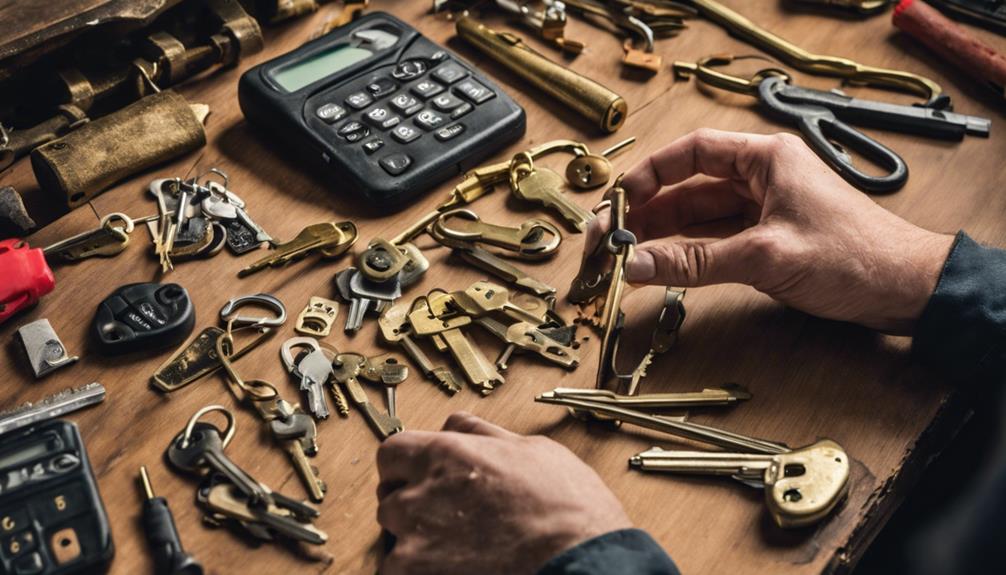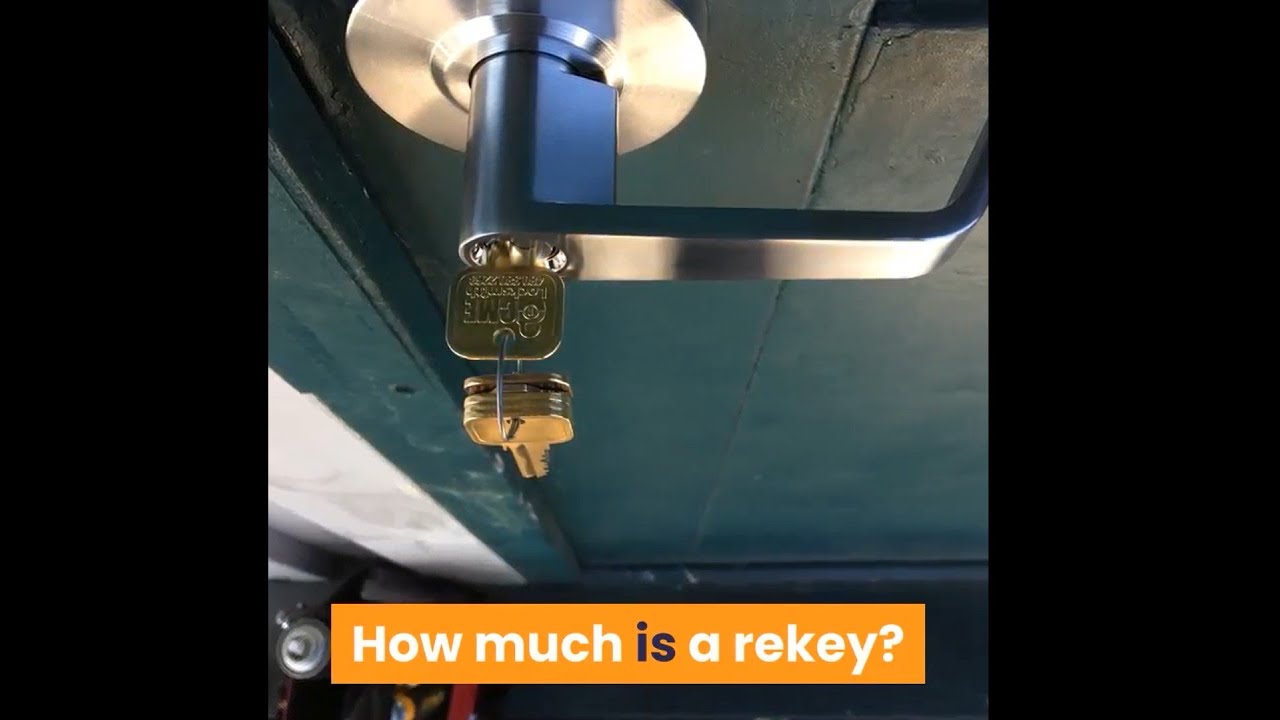Understanding the costs of lock rekeying helps you make smart security choices. The price varies based on lock type, system complexity, and the number of locks. Professional rekeying services generally cost between $50 to $150 per lock, while DIY kits range from $20 to $50. You'll spend more if you need extra keys and lock lubricant too. Although DIY might seem cheaper initially, mistakes can lead to higher long-term costs. Weighing the options carefully guarantees you invest wisely in security. Keep exploring to discover more insights into making the best decision for your needs.
Key Takeaways
- Rekeying costs vary based on lock type, complexity, and the number of locks involved, impacting overall expenses.
- DIY rekeying can save money but requires a rekeying kit and basic skills, along with time investment.
- Professional rekeying services typically range from $50 to $150 per lock, offering expertise and warranties.
- Geographic location affects service fees, with urban areas generally having higher costs than rural regions.
- Choosing high-quality locks and services can enhance security and reduce long-term repair expenses.
Factors Affecting Rekeying Costs
When contemplating rekeying your locks, it's essential to recognize the various factors that can influence the overall cost. First, the type of lock you have plays a significant role. High-security locks often require specialized tools and expertise, driving up the expenses.
Additionally, the complexity of the current locking system can affect labor time and costs; more intricate systems may take longer to rekey. This process can be a more cost-effective solution compared to full lock replacements, providing both security and savings benefits.
Another factor affecting rekeying costs is the number of locks you wish to rekey. If you're rekeying multiple locks, some locksmiths may offer a discount for bulk services, making it more economical for you.
You'll also want to take into account the locksmith's experience and reputation. While hiring a less experienced technician might seem cost-effective, it could lead to issues down the road, potentially costing you more in repairs or replacements.
Lastly, geographic location matters. In urban areas, locksmith services may charge higher fees compared to rural regions.
DIY Lock Rekeying Expenses
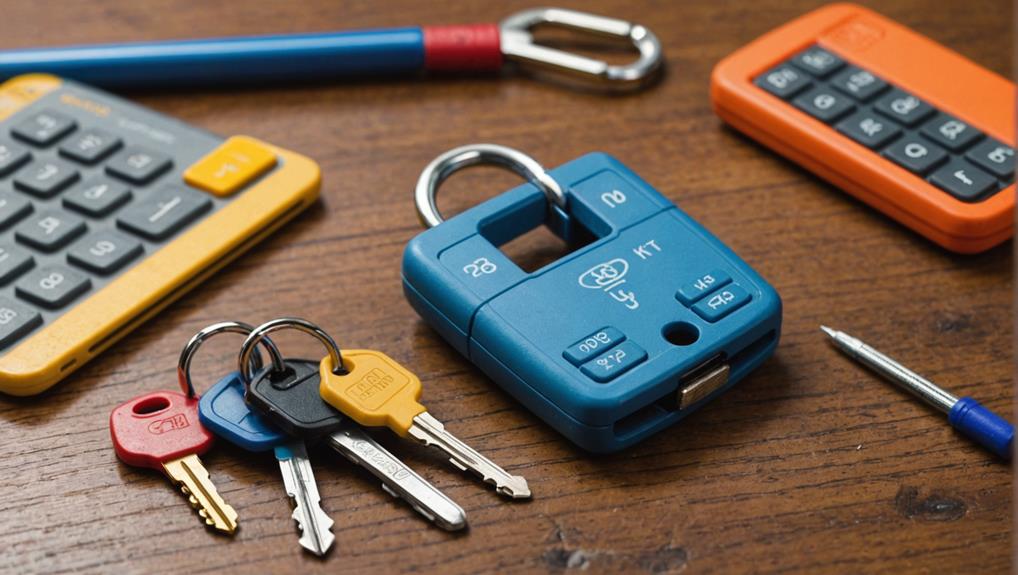
If you're considering rekeying your locks yourself, it's important to understand the expenses involved. DIY rekeying can be a cost-effective solution, but you'll need to factor in a few key components. Here's a breakdown of typical DIY rekeying costs you might encounter:
| Item | Estimated Cost | Notes |
|---|---|---|
| Rekeying Kit | $20 – $50 | Usually includes necessary tools and pins. |
| Additional Keys | $1 – $5 each | Costs vary by type and quantity. |
| Lock Lubricant | $5 – $10 | Essential for smooth operation post-rekeying. |
| Time Investment | Variable | Your time is valuable; consider how long the task will take. |
As you weigh these costs, remember that rekeying your locks can enhance your home's security without breaking the bank. You're not only protecting your home but also potentially saving on professional fees. Just make sure you're comfortable with the process and have the right tools at hand. This way, you'll feel confident in your ability to serve others by ensuring their safety, too!
Professional Rekeying Service Costs
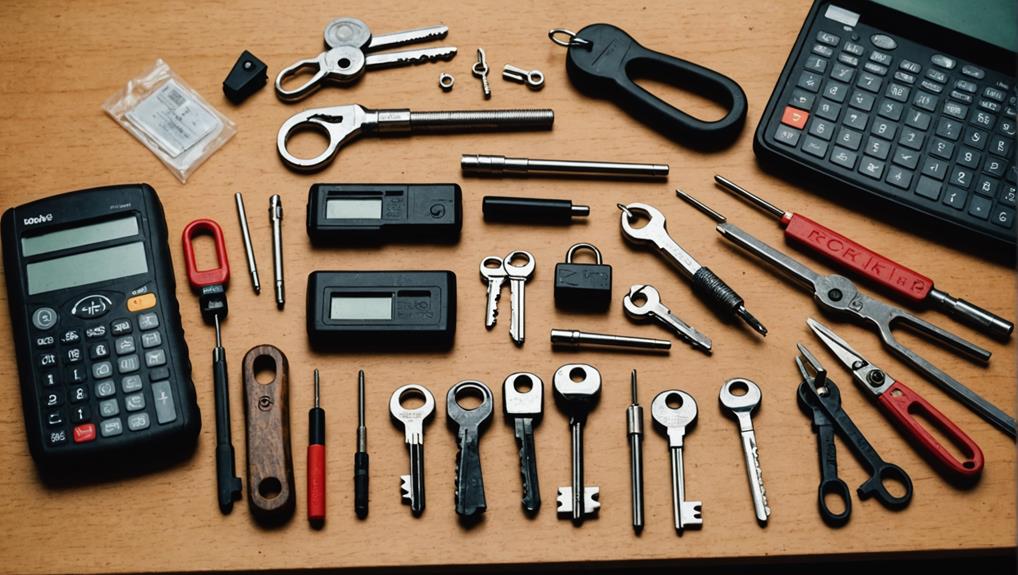
Hiring a professional for lock rekeying typically costs between $50 and $150 per lock, depending on various factors. These factors include the type of lock, the complexity of the rekeying process, and your location.
When you're considering professional rekeying costs, remember that investing in experts not only guarantees the job is done right but also enhances your peace of mind.
You're likely looking to serve your community or loved ones by guaranteeing their safety and security. A professional locksmith has the skills and tools necessary to perform the task efficiently and effectively. They can quickly identify any potential issues with the locks, offering you solutions that a DIY approach might miss.
Moreover, many locksmiths provide warranties on their work, which adds an extra layer of security for you. While it may seem more expensive upfront, the long-term benefits of hiring a professional can outweigh those costs.
Comparing DIY vs. Professional
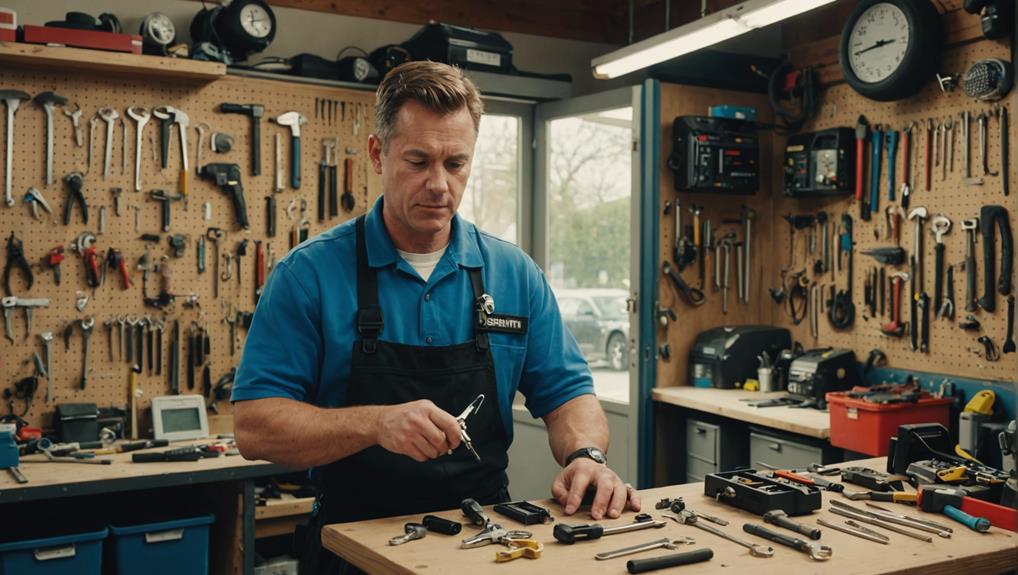
Deciding between DIY lock rekeying and hiring a professional often comes down to your skills, tools, and comfort level with the process. If you're handy and have the right tools, DIY can be a budget-friendly option. However, if you're unsure, professional help can guarantee the job is done correctly, potentially saving you from future headaches.
Here's a quick comparison:
| Aspect | DIY | Professional |
|---|---|---|
| Cost | Lower initial cost | Higher initial cost |
| Skill Required | Basic skills needed | Requires expertise |
| Time Investment | Variable | Usually quicker |
| Tools Needed | Basic tools | Specialized tools |
When considering the cost of lock rekeying, remember to factor in the potential for mistakes with DIY. If you don't have the necessary skills, the cost of rekeying a lock yourself could end up being more expensive in the long run. Ultimately, think about what serves you best and guarantees your peace of mind. Whether you choose DIY or a professional, your safety and satisfaction should always come first.
Additional Considerations and Tips
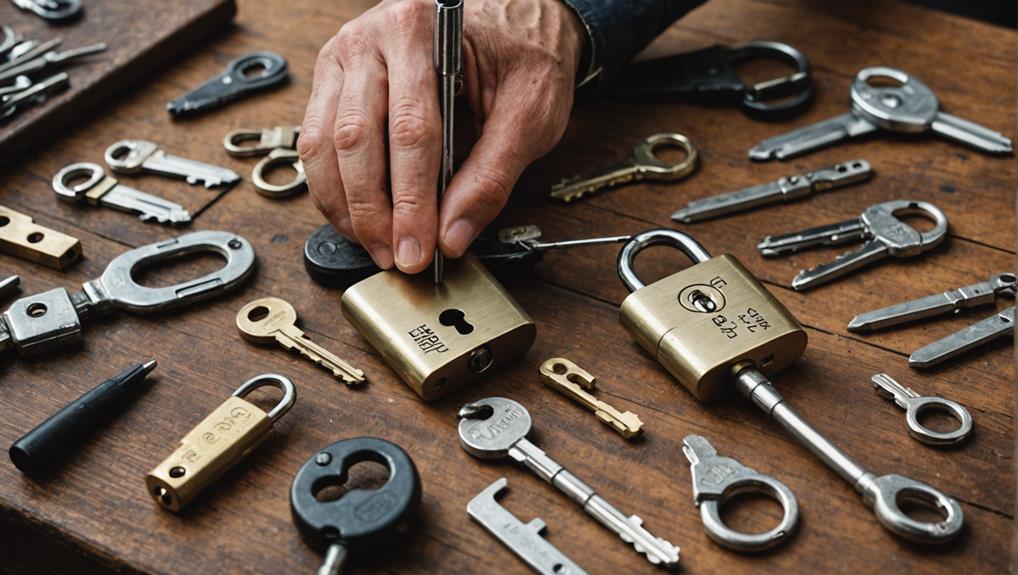
When tackling lock rekeying, it's important to keep a few additional considerations in mind to guarantee a smooth process.
You want to ascertain that the rekeying not only serves your needs but also those of anyone relying on your space for safety and security.
It's also worth noting that rekeying is often more cost-effective than replacing locks entirely, which can be beneficial for property owners looking to save money.
Here are three key points to remember:
- Choose Quality: Invest in high-quality locks and rekeying services. A reputable service can provide you with a rekeying price guide to help you make informed decisions, especially when comparing costs of rekeying vs. replacing locks.
- Timing Matters: Consider rekeying your locks during low-traffic periods. This ascertains minimal disruption for you and anyone else who uses the space, allowing for a seamless experience.
- Communicate: Keep everyone informed about the process. Whether it's family members or employees, letting them know about the rekeying will help maintain trust and security in your environment.
Frequently Asked Questions
How Often Should I Rekey My Locks?
You should consider rekeying your locks whenever you move into a new home, lose a key, or experience a security breach.
It's also smart to rekey after a breakup or if someone you no longer trust has access to your keys.
Regularly evaluating your security every few years can help, too.
Keeping your locks updated guarantees that you maintain a safe environment for yourself and those you care about.
Can I Rekey Locks Myself Without Special Tools?
You might think you can easily rekey your locks without special tools, but it's trickier than it seems.
While some locks have user-friendly mechanisms, others require specific tools for proper rekeying.
If you're determined to do it yourself, you can find kits that simplify the process.
Just remember, you're not just changing a lock; you're enhancing security for yourself and others.
What Types of Locks Can Be Rekeyed?
You can rekey several types of locks, including standard pin tumbler locks, deadbolts, and some smart locks.
Most residential locks are designed for rekeying, making it easier for you to enhance security without replacing the entire lock.
Just remember, some high-security locks might require professional tools or expertise.
If you're unsure, it's always a good idea to consult a locksmith, ensuring you're serving your needs and keeping your space secure.
Is Rekeying Safe for All Types of Properties?
Rekeying can be safe for most properties, but it depends on the type of lock and your specific security needs.
If you're dealing with standard residential or commercial locks, rekeying is usually a reliable option.
However, for high-security locks or those with complex mechanisms, you might want to reflect on a full replacement.
Always assess your property's unique situation and consult a professional to guarantee you're making the best choice for safety.
Will Rekeying Affect My Insurance Coverage?
Rekeying your locks can impact your insurance coverage, so it's crucial to check with your provider first.
Some insurance companies may require you to notify them of any changes to your security measures.
If you've recently had a break-in or security incident, rekeying might even be seen as a positive step toward improving safety.
Always keep your insurer in the loop to make certain you're covered and protected in case of any future incidents.
Conclusion
In the end, rekeying your locks is like giving your home a fresh set of keys to a new chapter. Whether you choose to tackle it yourself or hire a pro, understanding the costs will help you make the best choice. Just like investing in a good pair of shoes makes walking easier, investing in proper security keeps your peace of mind intact. So weigh your options, and step confidently into a safer future!

